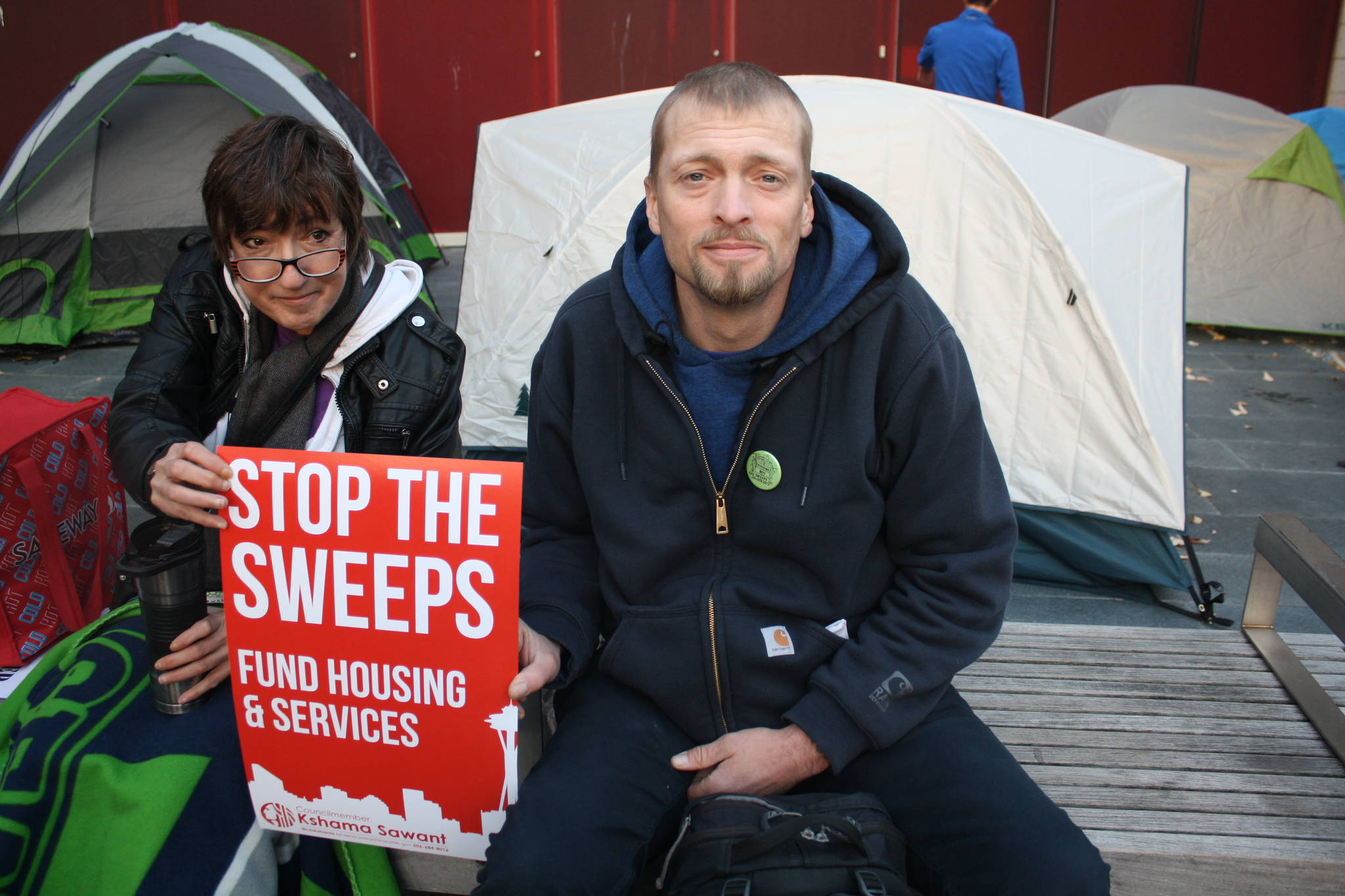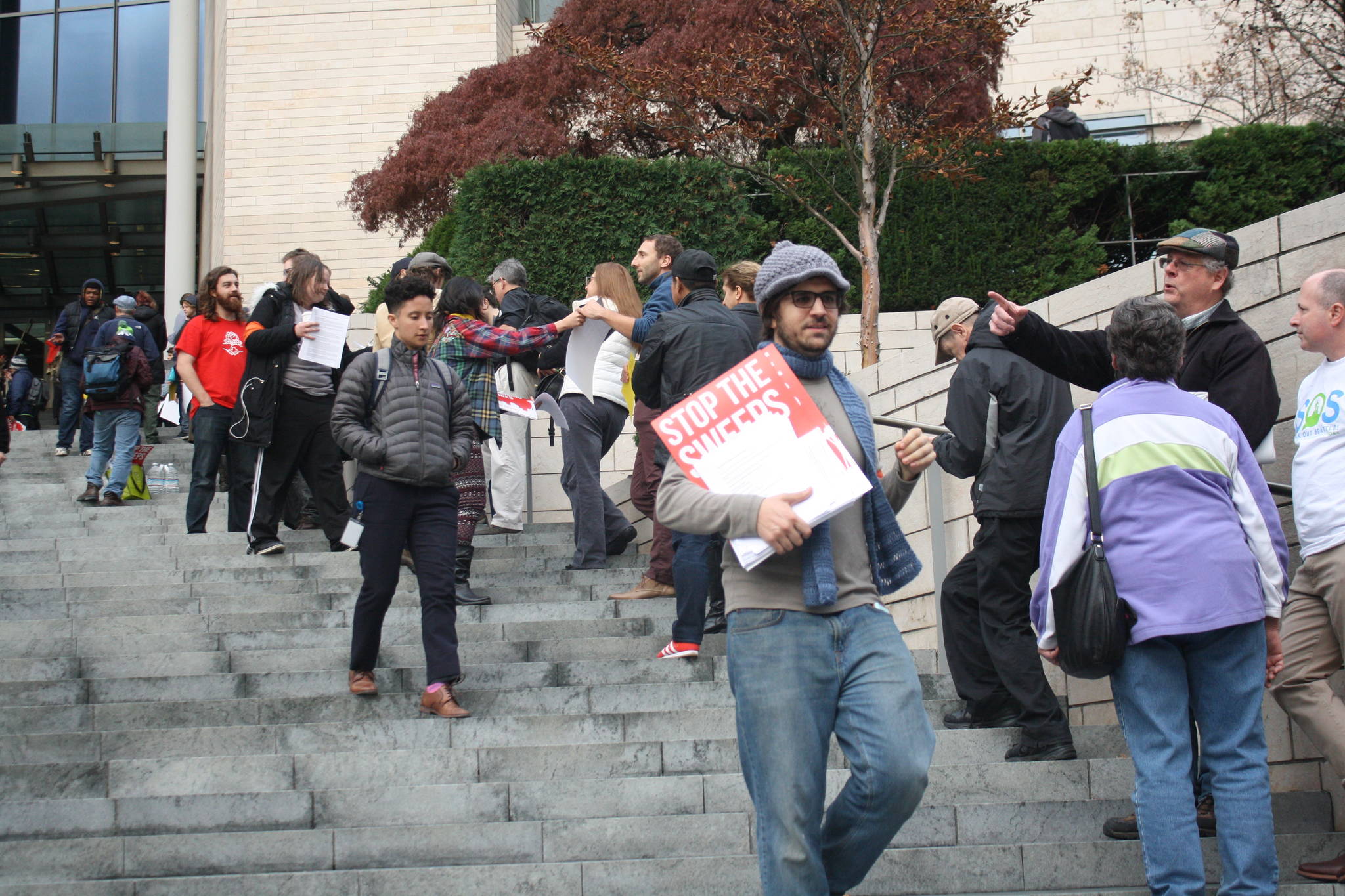Daniel Brown, 37, has been houseless off and on since he left his home in Montana in 1997, but mostly “on,” he says while sitting on a wooden bench outside of City Hall on Wednesday evening. After leaving Montana, Brown hopped around the country from Seattle to Denver to Salt Lake City until settling in the city again about three years ago.
Drug addiction, alcoholism, and a lack of work skills have prevented Brown from finding stable work and housing. He’s currently staying at Tent City 3 in the University District, but has grown accustomed to being on the move; he keeps all of his possessions on his back in case of another sweep, he says, pointing to a black backpack at his feet. The city last removed his shelter about a year ago when he was sleeping under Interstate 5 on Cherry Street. But the sweeps hardly faze him anymore; he’s experienced them a number of times now.
“I’m desperate for change in my own life,” Brown adds—a desperation that brought him to an evening protest outside of City Hall to mark the two-year anniversary of the city’s declaration of a state of emergency on homelessness. Organized by the Housing for All Coalition, the protest also coincided with the public hearing on the 2018 budget, and was designed to push city councilmembers to fund shelter and services and stop sweeps of unauthorized homeless encampments.
When asked how his life has changed in the past two years, Brown pauses before responding. “Seattle has always had the resources that I’ve needed … to get straight and get clean,” he says, explaining that “my life’s changed drastically” because of personal choice. “I don’t know that it’s been changed because we’ve been put in a state of emergency.”
Sometimes Brown earns money by picking up landscaping gigs for $15 an hour, but the work only lasts for a couple of hours and isn’t enough to afford rent. So instead he spends most of his time in a methadone rehab program and learning basic computer skills at the Goodwill. He’s ready to begin the next chapter of his life, he says, which includes accomplishing goals like taking college classes and finding more permanent housing.
In February, in an attempt to address the crisis, the city created a Navigation Team composed of clean-up teams, police officers, and outreach members who attempt to relocate houseless people to alternative living situations. Between February and October, the team provided at least 581 people with referrals to shelters, and removed 143 camps, according to data acquired by the Seattle Times.
Despite the city’s efforts, over 11,600 people were experiencing homelessness in January, according to All Home, which conducted a point-in-time count released in May. Before the state of emergency was declared in 2015, 10,047 people were experiencing homelessness, according to the Seattle/King County Coalition on Homelessness.
Councilmembers kept this in mind as they composed budget provisos. Councilmembers Kshama Sawant, Mike O’Brien, and Kirsten Harris-Talley wrote a budget proposal that would largely cut funding for the removal of unauthorized encampments, but Councilmember Lisa Herbold, the budget-committee chair, did not include it in the initial budget package. Herbold suggested a proposal that would still allow funding for encampment evictions that follow city rules.
On Wednesday evening, people formed a line leading out the door and onto the street to speak at the public hearing about the sweeps and a newly proposed tax on big businesses that would garner over $20 million annually.
Shortly beforehand, Mayor Tim Burgess released a memo chastising the idea of blocking funding for the removal of unauthorized encampments; doing so “will create an elevated public health and safety risk to the people of Seattle,” it reads.
Yet over 100 people signed up to speak before the City Council Wednesday evening, and most of the speakers were in support of blocking funding; only a smattering of people spoke in favor of it continuing. Throughout the public comments, attendees broke out in a chant: “We are ready to fight, housing is a human right!” Red signs bearing the words “Stop the Sweeps Find Housing & Services” in white letters bobbed around in the crowd. Most of the speakers stated that the obvious solution to houselessness was housing the homeless; a number of them declared: “We sweep trash and not people.”
Attendees in support of blocking sweeps funding ranged in age and profession. An activist who was part of Socialist Alternative came to the podium and said, “More data isn’t needed to take action today—66 people died on the streets this year alone,” while cricitizing Herbold for not trying to block funding of the evictions.
A few seniors from a local high school wore red scarves and took turns reading from their speech that included statistics and spoken word poetry as one teen strummed an acoustic guitar. “We need an increase in outreach for this population seeking equitable access to these vital social services,” said one of the students. Attendees snapped their fingers in agreement.
Some members of Speak Out Seattle! spoke of their support for the sweeps, but were drowned out by hissing from the crowd.
All the while, activists and houseless people congregated outside of City Hall to listen to impromptu speeches and music. An HQ tent provided free tents and blankets for those who planned on staying the night.
M, whose name isn’t being used to protect her identity, is houseless and desperate for access to resources. She became homeless when she moved to Seattle from West Virginia a year ago to escape domestic violence. Although she has a master’s degree in social work, she says that it’s been nearly impossible to find work that will allow her to pay for apartment rent. Instead, she sleeps in a tent as she continues applying for jobs. M came to the protest as an act of solidarity with other houseless people and to make some connections. She plans on creating a blog that will act as a resource for houseless people to find electrical outlets, bathrooms, water, and other resources around the city.
“Access to services, showers, laundry: those things are really difficult to get here,” M said. When asked if there’s not already a resource that lists available services, she replied, “No, not for homeless people.”









